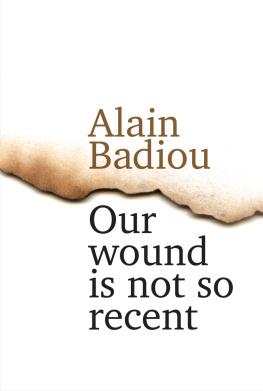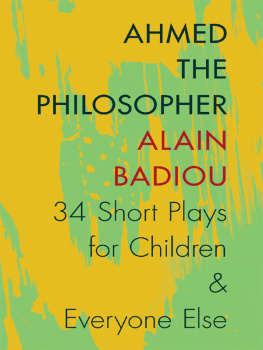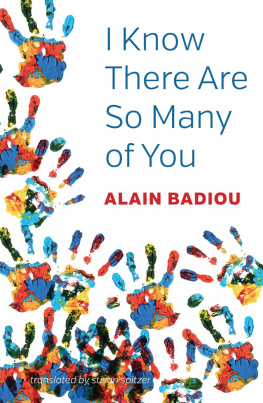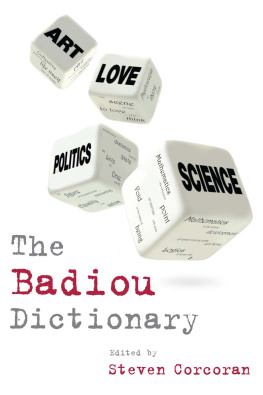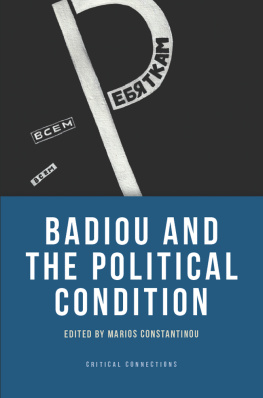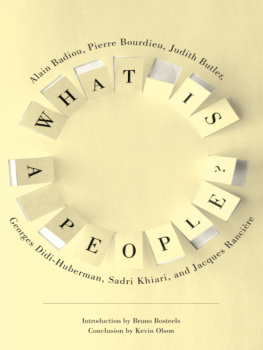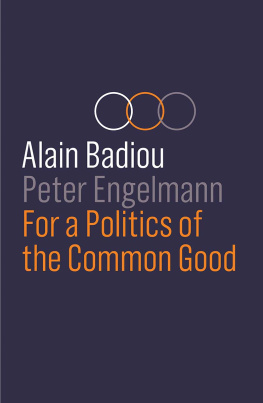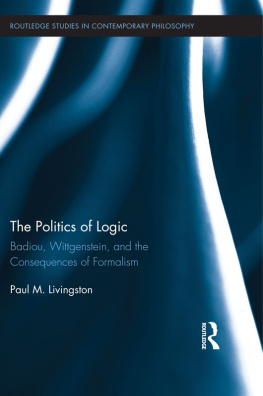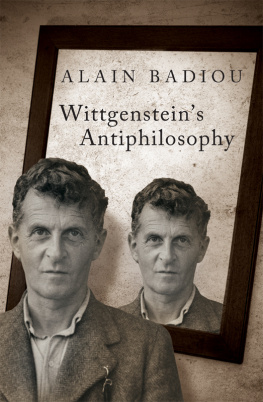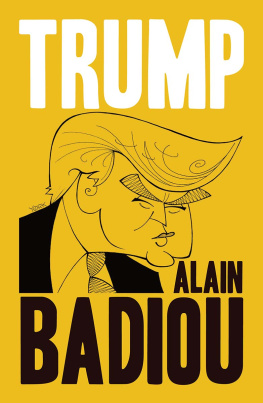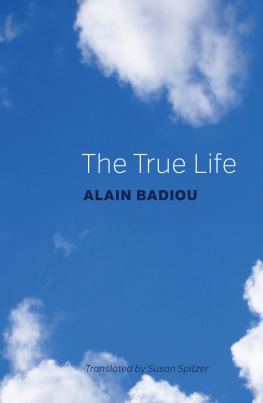Contents
Guide
Pages

Our Wound is Not So Recent
Thinking the Paris Killings of 13 November
Alain Badiou
Translated by Robin Mackay
polity
First published in French as Notre mal vient de plus loin. Penser les tueries du 13 novembre, Librairie Arthme Fayard, 2016
This English edition Polity Press, 2016
Polity Press
65 Bridge Street
Cambridge CB2 1UR, UK
Polity Press
350 Main Street
Malden, MA 02148, USA
All rights reserved. Except for the quotation of short passages for the purpose of criticism and review, no part of this publication may be reproduced, stored in a retrieval system, or transmitted, in any form or by any means, electronic, mechanical, photocopying, recording or otherwise, without the prior permission of the publisher.
ISBN-13: 978-1-5095-1496-0
A catalogue record for this book is available from the British Library.
Library of Congress Cataloging-in-Publication Data
Names: Badiou, Alain, author.
Title: Our wound is not so recent : thinking the Paris killings of 13 November / Alain Badiou.
Other titles: Notre mal vient de plus loin. English
Description: Malden, MA : Polity Press, 2016. | Includes bibliographical references.
Identifiers: LCCN 2016013510| ISBN 9781509514939 (hardback : alk. paper) | ISBN 9781509514953 (mobi)
Subjects: LCSH: Terrorism--France--Paris--History--21st century. | Terrorism--Social aspects. | Political violence. | Capitalism.
Classification: LCC HV6433.F7 B3313 2016 | DDC 363.3250944/361090512--dc23 LC record available at https://lccn.loc.gov/2016013510
The publisher has used its best endeavours to ensure that the URLs for external websites referred to in this book are correct and active at the time of going to press. However, the publisher has no responsibility for the websites and can make no guarantee that a site will remain live or that the content is or will remain appropriate.
Every effort has been made to trace all copyright holders, but if any have been inadvertently overlooked the publisher will be pleased to include any necessary credits in any subsequent reprint or edition.
For further information on Polity, visit our website: politybooks.com
This text is a transcript of a special seminar given by Alain Badiou on 23 November 2015 at the Thtre de la Commune dAubervilliers, Paris. Our thanks to director Marie-Jos Malis and to the staff of the theatre, for hosting the event.
This evening I would like to talk about what happened on Friday 13 November: what happened to us, what happened to this city, to this country, and ultimately to this world.
I would first like to say in what state of mind I think we should speak of what is an atrocious tragedy. Because, obviously, as we know, and as is being dangerously hammered home by the press and by the authorities, the function of affect, of sensible reaction, is inevitable in this kind of situation, and in a certain sense indispensable. There is something like a trauma, the feeling of an intolerable exception to the regime of ordinary life, an unbearable irruption of death. This is something we all feel, and which we can neither contain nor subject to criticism.
But all the same, we need to realize and this is the starting point for considering what I call our state of mind that this inevitable affect, in these kinds of tragic circumstances, exposes us to many risks, risks that I would like to enumerate, so as to indicate what my method here will be.
I see three principal risks to which we are exposed, following this drama, by the unadulterated domination of trauma and affect.
The first is that of authorizing the state to take futile and unacceptable measures, measures that in reality function only for its own profit. The state is abruptly brought to the fore and for a moment rediscovers, or thinks it has rediscovered, its function of symbolic representation, as the guarantor of the unity of the nation, and other such postures. Which allows us and Ill come back to this to perceive in the senior staff a rather sinister but undeniable enjoyment of this criminal situation. In such conditions, we must nonetheless maintain a certain measured attitude. We must remain capable of discriminating, in what is done, in what is pronounced, between that which is inevitable and necessary, and that which is futile and unacceptable. This is the first precaution I think is necessary: that of remaining measured in regard to let me say once again the both inevitable and indispensable nature of affect.
The second risk of this domination of the sensible, lets call it that, is the reinforcing of identitarian drives. This, also, is a natural mechanism. It is obvious that, when a family member dies in an accident, the family gathers, pulls together and, in a certain sense, consolidates. In the days following this tragedy we have been assured, indeed they tell us again and again, with the tricolour flag in hand, that a horrific massacre on French territory can only reinforce national sentiment. As if trauma automatically referred us back to an identity. Hence the words French and France are heard from every quarter, as if they were a self-evident component of the situation. Well, lets ask the question: How so? What actually is France in this affair? What do we mean today when we speak of France and of the French? In reality, these are very complex questions. We absolutely must not lose sight of this complexity: the words France, French, today have no simple, self-evident meaning. Moreover, I think that we must make the effort, precisely against this identitarian drive which would incorporate the terrible event into a sort of false pretext, to remind ourselves that such terrifying mass murders have happened and are still happening every day elsewhere in the world. Yes, every day, in Nigeria and Mali, very recently indeed, in Iraq, in Pakistan, in Syria. Its important also to remember that in October 2015, two hundred Russians were massacred in a sabotaged aeroplane, and that in France, emotions didnt run particularly high about it. Perhaps the supposed French identify all Russians with the wicked Putin!
I think that it is one of the fundamental tasks of justice always to broaden, as far as possible, the space of public affects, to struggle against their identitarian restriction, to remember and to know that the space of misfortune is a space that we must envisage, ultimately, on the scale of all of humanity, and that we must never retreat into declarations that limit it to some identity or other. Otherwise, misfortune itself ends up confirming the notion that what counts are identities. Now, the idea that what counts in a misfortune is only the identity of the victims is a perilous perception of the tragic event itself, because inevitably, this idea transforms justice into vengeance.
Obviously, the temptation to vengeance, with this type of mass criminal act, is a drive that seems natural. The proof of this is that, in our country, which always boasts of its rule of law, and which rejects the death penalty, the police, in the type of circumstance that we have seen here, kill the murderers as soon as they find them, without make no mistake without any kind of trial; and that no one, it seems, is bothered by this. However we must remember that vengeance, far from being an act of justice, always opens up a cycle of atrocities. Long ago, the great Greek tragedies opposed the logic of justice to the logic of vengeance. The universality of justice is the contrary of familial, provincial, national, identitarian vengeance. This is the fundamental subject of Aeschylus

